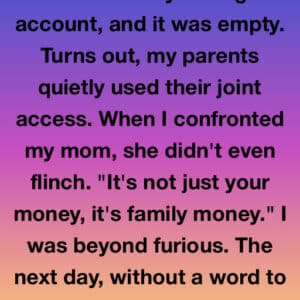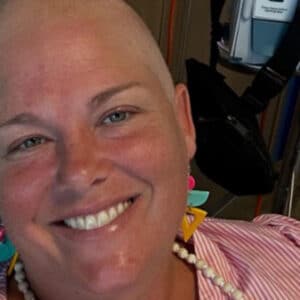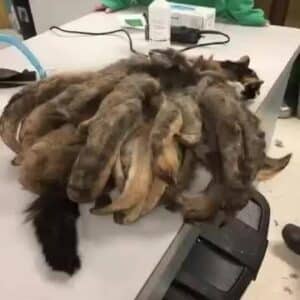I’m Sarah, 34, a single mom of two who drives a city bus. It’s not glamorous, but it keeps the lights on and the fridge full. Lily is three, Noah’s eleven months, and their dad is a ghost. My mother lives with us, trading sleep for coffee and kisses on tiny foreheads. We take turns being exhausted.
Most nights I finish close to midnight. The city goes quiet then, holding its breath. I kill the lights, grab my bag, and do one last walk-through—lost gloves, crumpled receipts, the occasional candy wrapper. That night the cold had teeth. The windows were fogged from the inside; every breath made a small cloud. I was already imagining the warm weight of Noah tucked under my chin when I heard it: a thin sound from the back. Not a cry, exactly. A whimper.
I called out and got silence. Then another tiny sound. I moved down the aisle, heart thudding, and saw a small bundle on the last seat—a pink blanket glazed with frost. I pulled it back and gasped. A baby. Pale skin, blue-tinged lips. She wasn’t really crying anymore, just breathing in shallow, tired sips.
“Hey, hey. I’ve got you,” I whispered, though I don’t remember choosing the words. I tucked her under my coat, pressed her to my chest, tried to share whatever heat I had. No bag, no car seat, nothing. Just a folded note in the blanket: Please forgive me. I can’t take care of her. Her name is Emma.
I ran. By the time I reached my car my hands were useless blocks, but I started the engine, cranked the heat, and drove home with her bundled beneath my coat. My mom met me at the door, eyes wide. We wrapped the baby in everything we owned—quilts, towels, my winter coat—and sat on the floor by the heater, murmuring little prayers we hadn’t used in years. Her fingers were ice. Her eyes stayed closed.
A thought came like a struck match. I was still breastfeeding, barely—Noah was weaning—but maybe it would be enough. “Try,” my mother said. I guided Emma’s mouth and held my breath. For a moment: nothing. Then a stir, a latch, the faintest flutter of a swallow. I exhaled in a sob. “She’s drinking,” I whispered. “She’s drinking.”
We didn’t sleep. I kept her against my skin, cheek to my chest, humming the old lullabies until the night thinned gray. By morning, her cheeks were pink again; her fingers made little fists. I called 911. The paramedics checked her and nodded. “She’s stable,” one said. “You may have saved her life.” I sent them off with pumped milk, a few diapers, and Noah’s too-small hat. “Tell them she likes to be held close,” I said. “We will,” he promised.
When the door clicked shut, the house felt too quiet. The scent of baby lotion clung to the couch. The folded pink blanket glowed on a chair. I tried to drink coffee, but my hands shook. I kept seeing her blue mouth, then the moment it warmed to color in my arms.
Three days later I was making roast chicken, trying to coax normal back into the kitchen while Lily mashed potatoes with serious concentration. The doorbell didn’t ring; a car engine did. I parted the curtain and blinked at a black Rolls-Royce purring at the curb. A tall man in a wool coat and leather gloves stepped out. His hair was silver. His posture said he didn’t knock on doors like mine.
“Are you Sarah? The bus driver?” he asked.
“I am.”
“I believe you found a baby a few nights ago.”
“Emma,” I said. “Is she okay?”
“She’s alive,” he said, softening. “Because of you.” He looked at his hands, then back at me. “She’s my granddaughter. My name is Henry.”
He sat on the porch bench and told me about his daughter, Olivia—years of depression and addiction, then silence. A missing persons report. No one knew she was pregnant. “She turned herself in yesterday, after she saw the news,” he said. “She told the police she didn’t want to hurt her baby. She just didn’t know what else to do.”
“She left her on a bus,” I said, trying to anchor the edges of the story.
“She said you smiled at her when she boarded. Emma was wrapped in her coat. She wasn’t sure you even saw. But your face felt safe.” I searched my memory: a blur of late-night riders, the way habit becomes kindness because there’s not enough of it in the world. “I smile at everyone,” I said. “Maybe that’s why she trusted you,” he replied.
“Is Olivia okay?”
“She’s in a hospital now. Getting help. She asked us not to bring Emma yet. But she’s trying. Emma being safe gave her the courage to start over.”
He pulled a small envelope from his coat and pressed it into my hands. “I know you didn’t do this for money. Please—accept this as gratitude.” After the car slid away, I opened it. A note, careful handwriting: You didn’t just save Emma’s life. You saved my family’s last piece of hope. Under it, a check big enough to breathe for the first time in months—rent for a year, the past-due stack cleared in a single sigh.
Three months later, Henry called. “Emma’s thriving,” he said. “Healthy, strong. Smiles all the time.”
“I think about her every day,” I told him.
“She’s a fighter. Just like the woman who found her.”
“Tell her she was loved that night,” I said, swallowing. “Even if she won’t remember it.”
“I will,” he promised. “She’ll grow up knowing who you are. And what you did.”
I still walk my bus after every shift. I still pause at the last seat and listen to the quiet. Sometimes I swear I hear her again, that small sound that started as a whimper and turned into a life. Not every miracle arrives in sunlight. Some come wrapped in a thin pink blanket, in a night so cold your breath turns white, and they leave behind a warmth that never leaves your chest.





